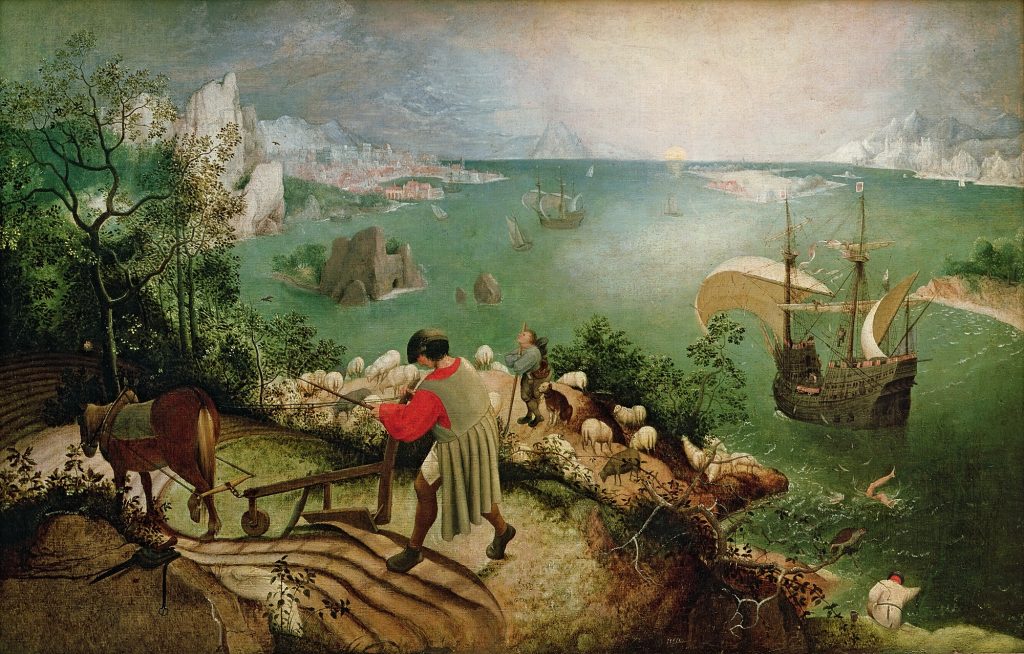
W.H. Auden (1907-1973)
Musée des Beaux Arts
About suffering they were never wrong,
The old Masters: how well they understood
Its human position: how it takes place
While someone else is eating or opening a window or just walking dully along;
How, when the aged are reverently, passionately waiting
For the miraculous birth, there always must be
Children who did not specially want it to happen, skating
On a pond at the edge of the wood:
They never forgot
That even the dreadful martyrdom must run its course
Anyhow in a corner, some untidy spot
Where the dogs go on with their doggy life and the torturer’s horse
Scratches its innocent behind on a tree.
In Breughel’s Icarus, for instance: how everything turns away
Quite leisurely from the disaster; the ploughman may
Have heard the splash, the forsaken cry,
But for him it was not an important failure; the sun shone
As it had to on the white legs disappearing into the green
Water, and the expensive delicate ship that must have seen
Something amazing, a boy falling out of the sky,
Had somewhere to get to and sailed calmly on.
I love poems about paintings. That makes sense because I am an into both literature and art history. I loved words first, and images second, but now I can no longer decide. This is a poem that only works under two conditions: you need to know the story of Icarus (and his father Daedalus) fleeing from Crete and you need to take a good look at the painting and figure out why it has the title “Landscape with the Fall of Icarus.” You should be able to click on the link and see a larger version that you can scroll around in. And then, after you’ve read the poem, look at the painting again. Think about what you are getting out of going back and forth. Do you see Icarus in the painting, the “white legs disappearing into the green / Water”? The “expensive delicate ship”? The ploughman? I have to admit I didn’t really see them until the poem made me pay attention. This is how words and images work together for me.
Auden is right that Bruegel/Breughel (although not necessarily all “old Masters” or even all Dutch painters from the time when he painted this, in the mid-16th century) deliberately distracts our eye away from the suffering, and his poem makes me stop and realize that we are forever not seeing it unless it is our own. That to see and feel what another person is going through takes a really, really close look that we are usually not taking–searching for the drowning Icarus, the stranger in pain, in the sea of impressions and ideas that surround us, because we have “somewhere to get to” and go on with our lives, doggy or not. I remember thinking about this when our friend Tam was dying. I was in the hospital, looking out of the window onto the hospital parking lot and the street, trying to deal with the pain of losing her, and trying to imagine the more intense pain that her husband and kids and her mom were going through, and seeing cars pulling in and out, with people in them that had no idea of all this unbearable suffering. I thought of this poem then, and how well Auden (and not just Breughel) captured the way we normally all live in our own bubble, attuned to our own feelings but not those of others. But Auden also offers me an an antidote to the feelings of loneliness and desperation that this can cause: contemplating the nearly-invisible suffering of others in corners and untidy spots, and thus making it visible, for all to see, by writing about it. This poem has helped me to pay closer attention to what others go through–and not to expect that they will understand what I might be going through (unless I am spelling it out, and maybe not even then).
I am adding a snippet from another W.H. Auden poem, although a third you might like is “September 1, 1939” on the beginning of World War II, and the weird normalcy all around the speaker as the world is going to pieces. Again, its relevance to today will take your breath away. The snippet below is from a tribute to another writer, the Irish poet W.B. Yeats, written after Yeats’ death, and I thought of our conversations about language, because it is about the power of poetry, about what it can and cannot do. You can read the whole poem, “In Memory of W.B. Yeats,” here, but this is the part I love, Part II:
You were silly like us; your gift survived it all:
The parish of rich women, physical decay,
Yourself. Mad Ireland hurt you into poetry.
Now Ireland has her madness and her weather still,
For poetry makes nothing happen: it survives
In the valley of its making where executives
Would never want to tamper, flows on south
From ranches of isolation and the busy griefs,
Raw towns that we believe and die in; it survives,
A way of happening, a mouth.